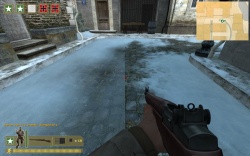WorldVertexTransition: Difference between revisions
Jump to navigation
Jump to search

 Note:This shader now only works on displacements.
Note:This shader now only works on displacements.
No edit summary |
No edit summary |
||
| Line 37: | Line 37: | ||
* <code>[[LightmappedGeneric]]</code> | * <code>[[LightmappedGeneric]]</code> | ||
* <code>[[Lightmapped_4WayBlend]]</code> | |||
* <code>[[WorldTwoTextureBlend]]</code> | * <code>[[WorldTwoTextureBlend]]</code> | ||
* <code>[[LightmappedTwoTexture]]</code> | * <code>[[LightmappedTwoTexture]]</code> | ||
Revision as of 15:09, 20 January 2014

Application without and with
$blendmodulatetexture.WorldVertexTransition is the shader used to blend the vertices of a displacement surface between two different materials. It handles two at once by using a mirrored set of parameters with "2" in their name.
The pattern of the blend is defined by Hammer's alpha painting tool. The blend is normally a linear gradient, but it can also be "stamped" by a texture specified with $blendmodulatetexture. This command makes the material look considerably better for very little cost - use it often!
Example
WorldVertexTransition
{
$basetexture nature/dirtfloor006a
$surfaceprop dirt
$basetexture2 nature/rockfloor005a
$surfaceprop2 rock
%tooltexture nature/blendrockgrass004a_tooltexture
}
- Just about all visual effects can be selectively applied to one sub-material or the other. See the relevant articles for more details.
- The Hammer material browser won't be able to display a preview of the material unless it's given a
%tooltexture.
Supported effects
$blendmodulatetexture$seamless_scale$bumpmap$ssbump(whole material only)$detail(whole material only)$envmap- Todo:
$outline? $translucentand$alpha(whole material only)